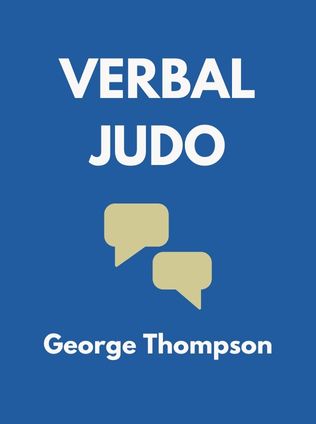
Verbal Judo
The Gentle Art of Persuasion
By George Thompson
Published 05/1993
About the Author
George J. Thompson, Ph.D., was a unique and influential figure in the fields of communication and law enforcement training. He held a Ph.D. in English from the University of Connecticut and pursued advanced studies in Rhetoric and Persuasion at Princeton University. Initially, Thompson dedicated his career to academia, teaching English and philosophy for over a decade. However, his career took a pivotal turn when he joined the police force, seeking a more hands-on application of his knowledge.
As a police officer, Thompson quickly recognized that effective communication was the cornerstone of successful law enforcement. He observed that veteran officers who could de-escalate tense situations without resorting to physical force were often the most respected and effective in their roles. Drawing on his academic background and his experiences in the field, Thompson developed Verbal Judo, a set of communication strategies designed to defuse conflicts and manage confrontational situations with words rather than force.
Thompson’s Verbal Judo methodology became widely adopted in law enforcement training across the United States, and he went on to train more than a million police officers. His techniques have since been applied in various fields, including customer service, education, and healthcare, where effective communication under pressure is critical. Through his work, Thompson left a lasting legacy, empowering people to handle conflicts with tact, empathy, and skillful communication.
Main Idea
"Verbal Judo" is a communication methodology that equips individuals with the tools to handle confrontations and high-stress situations effectively. Drawing on principles from martial arts, particularly judo, George Thompson teaches that verbal confrontations can be managed by redirecting the other person’s verbal aggression to achieve a peaceful and constructive resolution. The core idea of Verbal Judo is to use the energy of the other person to guide the conversation toward a positive outcome, much like how a judo practitioner uses an opponent’s force to gain control in a physical altercation.
The book outlines three foundational principles of Verbal Judo: empathy, mushin (a state of calmness), and impartiality. These principles are designed to help individuals respond to verbal attacks without escalating the conflict, thereby preserving relationships and achieving mutually beneficial outcomes. Although initially developed for law enforcement, the strategies in "Verbal Judo" are applicable in a wide range of personal and professional scenarios, making it a valuable guide for anyone looking to improve their conflict resolution skills and communication effectiveness.
Table of Contents
- Why Do You Need Verbal Judo?
- What Can Martial Arts Teach You About Communication?
- The Principles of Verbal Judo
- How to Practice Verbal Judo in Daily Life
- Case Studies and Real-Life Applications
- Final Thoughts on Effective Communication
Why Do You Need Verbal Judo?
Conflict is a natural and inevitable part of human interaction. Whether at work, at home, or in public, we all encounter situations where tensions rise and emotions run high. George Thompson begins "Verbal Judo" by emphasizing the importance of effective communication in these moments. He argues that how we respond to confrontations can either strengthen our relationships or lead to misunderstandings, frustration, and resentment. Most people react impulsively when under pressure, which can escalate the situation and create further conflict. Verbal Judo, however, encourages a more measured, thoughtful response.
Thompson's approach is particularly valuable for individuals who frequently find themselves in high-stress situations or who are responsible for managing conflicts, such as law enforcement officers, managers, teachers, and parents. By mastering Verbal Judo, individuals can learn to handle confrontations with less effort and more effectiveness, ultimately leading to better outcomes for all parties involved.
The Cost of Poor Communication
Poor communication in confrontational situations can have serious consequences, including damaged relationships, lost opportunities, and even physical altercations. Thompson explains that when people react defensively or aggressively, they often exacerbate the problem. Verbal Judo teaches individuals how to navigate these interactions without escalating tension, allowing for a more peaceful and constructive resolution.
The Benefits of Verbal Judo
By practicing Verbal Judo, individuals can maintain control in difficult situations, protect themselves from verbal attacks, and guide conversations toward a resolution that benefits everyone involved. Thompson emphasizes that the skills learned through Verbal Judo are not only useful in crisis situations but also in everyday interactions where clarity, respect, and understanding are needed. This approach fosters healthier relationships and more effective communication in all areas of life.
What Can Martial Arts Teach You About Communication?
Thompson draws a compelling parallel between martial arts and verbal communication. Just as martial arts like judo focus on using an opponent’s energy to one’s advantage, Verbal Judo emphasizes deflecting verbal aggression and redirecting it to achieve a positive outcome. This approach contrasts sharply with more aggressive communication styles that seek to overpower or dominate the other person, which often leads to further conflict and damaged relationships.
Sign up for FREE and get access to 1,400+ books summaries.
You May Also Like
The Subtle Art of Not Giving a F*ck
A Counterintuitive Approach to Living a Good Life
By Mark MansonRich Dad Poor Dad
What the Rich Teach Their Kids About Money - That the Poor and Middle Class Do Not!
By Robert T. KiyosakiHow To Win Friends and Influence People
The All-Time Classic Manual Of People Skills
By Dale CarnegieFreakonomics
A Rogue Economist Explores the Hidden Side of Everything
By Steven D. Levitt and Stephen J. Dubner



















